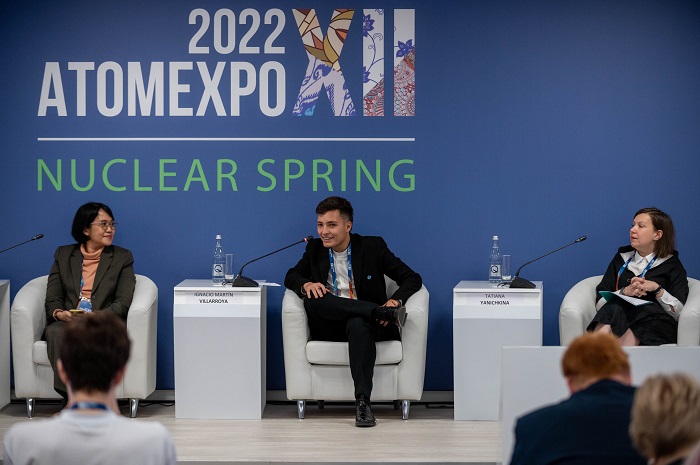On November 21, ATOMEXPO-2022 International Forum in Sochi hosted a roundtable discussion on Nuclear NGOs Pushing Atomic Technologies Forward.
Members of pro-nuclear civil society organizations and independent activists from Argentina, Egypt, Indonesia, Russia and South Africa discussed the contribution of grassroots initiatives to debunking myths about nuclear energy and promoting the benefits of peaceful atomic technologies for sustainable future. Ryan Collyer, CEO of ROSATOM Central and Southern Africa moderated the discussion.
The roundtable participants shared their own experiences, discussed challenges and opportunities, and presented best practices and the most effective formats of outreach activities.
Princess Mthombeni, Africa4Nuclear campaign founder kickstarted the discussion. She noted the importance of continuous public outreach in informing the public about the benefits of nuclear energy, “I believe nuclear energy is the most valuable technology on this planet, which can, and ultimately will be the reason millions of African people can live secure, healthy, happy, and fulfilling lives. The nuclear industry has been a tremendous asset to the world for decades. Yet, when the word “nuclear” is spoken, people think all the negative things. For people to stop being afraid of nuclear energy, we must talk more and show the features of its work.”
Leader for Woman Nuclear Development at Indonesia Nuclear Society, Dr. Geni Rina Sunaryo, spoke about the association’s activities in engaging women, “Main task of the Indonesian Nuclear Society is to provide the publics with the correct information related to nuclear. To increase women's interest in working in the nuclear industry, we try to select women speakers, especially in the fields of nuclear medicine, agriculture, environmental monitoring analysis and nuclear reactor safety. A woman speaker as an expert is chosen by us on a priority basis.”
Young activist from Argentina, who is the organizer of Jovenes por el Climа youth movement Ignacio Martin Villarroya noted that the emerging generation of climate activists was increasingly recognising the fact that nuclear power can be a solution to pressing climate problems: “My area of pronuclear work is to raise awareness about the importance of nuclear energy in the fair transition to low carbon energy sources. Especially among young activists that are the ones pushing forward the climate agenda. People are open to new information when they hear it from a person to whom they can relate, a peer. That is why we need more young people and “nuclear influencers” to join us in the spreading of our message.”

Director General of Energy of the Future Tatiana Yanichkina emphasized the importance of a human-centered approach in public outreach activities: “It is important to hear the voices of ordinary people. The loader they are the more compelling the story of nuclear would be. Followed by this approach last year we launched a special project called Atoms for Humanity, which is a unique global nuclear awareness campaign, capturing ordinary people from all over the world sharing how nuclear transforms their lives and helps fulfil dreams, both big and small.”
Founder of Green Society Initiative in Egypt Asmaa Hanafi Moursi talked about the most effective building awareness tools, which she created together with her family members: “In the promotion of nuclear energy we need to use more creativity. For example, we educate through art, creativity and the gamification of learning. My sister, a professional artist, and I created a board game based on a set of exclusive images to understand how a peaceful and safe nuclear energy contributes to the goals of sustainable development. So far, we have supported 10,000 schoolchildren and students in their quest to become future green leaders.”
The roundtable participants also commented on the possibility of cooperation between NGOs and grassroots groups and industry representatives. The conclusion was that it is possible and needed for pro-nuclear activists to work with businesses, but only when those business share the same vision, goals, and objectives.
